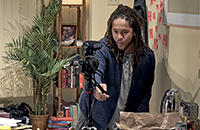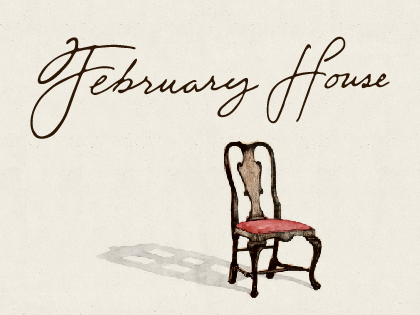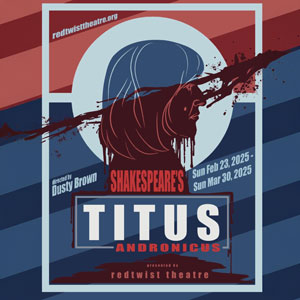
 *** RECOMMENDED Starring the incomparable Julian Parker, “I, Cinna (The Poet)” is a one-man show, based in part on Shakespeare’s play “Julius Caesar”, where playwright Tim Crouch morphs the politics and government of Ancient Rome with that of the present-day United States. What Crouch has done is to take a story about the wrongful death of a man in the distant past and make it contemporary with reference to the African American experience. The story is told as an autobiography as lived by a young black man who resides in a major city in the Roman Republic at a time when the transition to a dictatorship has already occurred. But the era is right now, and Cinna’s apartment is replete with modern conveniences such as cell phones and computers. When Crouch makes the events of Rome parallel to those in contemporary America, the ascension and demise of Caesar becomes a thinly-veiled reference to Donald Trump, whose followers have presumably sought the end of democracy as we know it in favor of elevating an all-powerful strongman. “They want a king, like the good old days,” says the modern Cinna, who is both a starving artist and a participant-observer within a society that is in turmoil.
*** RECOMMENDED Starring the incomparable Julian Parker, “I, Cinna (The Poet)” is a one-man show, based in part on Shakespeare’s play “Julius Caesar”, where playwright Tim Crouch morphs the politics and government of Ancient Rome with that of the present-day United States. What Crouch has done is to take a story about the wrongful death of a man in the distant past and make it contemporary with reference to the African American experience. The story is told as an autobiography as lived by a young black man who resides in a major city in the Roman Republic at a time when the transition to a dictatorship has already occurred. But the era is right now, and Cinna’s apartment is replete with modern conveniences such as cell phones and computers. When Crouch makes the events of Rome parallel to those in contemporary America, the ascension and demise of Caesar becomes a thinly-veiled reference to Donald Trump, whose followers have presumably sought the end of democracy as we know it in favor of elevating an all-powerful strongman. “They want a king, like the good old days,” says the modern Cinna, who is both a starving artist and a participant-observer within a society that is in turmoil.
Though this online show can boast of a lot of great elements including its scrupulous, searing ending, it is not without its problems. When the analogy between ancient and modern times goes too far, things start to fall apart. Cinna’s autobiography is interjected with snippets of disorderly mobs and police officers in riot gear, and it is unclear why these protestors have gathered. Is it to preserve democracy or push for equality or mourn Caesar or advocate for a future Roman emperor? In any case, Cinna is doomed. In Shakespeare’s original, there are two Cinnas: one is the Roman poet while the other conspires against Caesar and his reign. When the two characters are confused with each other, the poet dies in the hands of the mob during street violence in the wake of Caesar’s death. The mob doesn’t care, because in Shakespeare’s tale, they consider Cinna to be a bad poet, and the rabble scream: “Tear him for his bad verses, tear him for his bad verses” (Act III, Scene 3). In Crouch’s script, the two personas are apparently confused once again, although we don’t really know if Cinna is killed because he is identified with the conspiracy or if he is simply an unfortunate casualty of mob violence: of being in the wrong place at the wrong time. This brings us to the biggest problem with “I, Cinna”: Too much of the tale rests on the audience knowing something in advance about the possible confusion of the poet and the conspirator. Having this knowledge makes us feel that everything the poet says and does must be a prelude to some event that will occur later; however, without this knowledge to anchor the plot, we have no idea where things are going.
Moreover, the show’s pacing is far too slow, which dilutes the larger meaning of the story. We do feel for Cinna and his unfortunate plight as a man who must live on handouts. “Does a free man wait in line for bread?” is one of the many excellent lines in the production. But in the quest to document Cinna’s every thought in minuscule detail, the storyline becomes much too ponderous and plodding. We have a problem when Cinna relates the “breaking news” of major events that are unfolding in Ancient Rome, as compared to having the audience view these events for themselves on the live video stream on his laptop computer. Even when Cinna provides us with his second-hand account of what may have been going on in the minds of the conspirators, we miss hearing the scuttlebutt directly from news reporters and interviewees. When we do not feel the weight of Roman history and politics in real time, the news becomes too hum-drum, and we rapidly lose interest.
Throughout the show, we become acquainted with how hard Cinna struggles with his writing, as evinced by all the crumpled papers on his living room floor. Despite his doubts about himself and his work, the poet decides to provide the audience with a lesson as he writes his final poem. On several occasions, we are instructed to take out our notebooks and write down all these words he will give us in the course of the presentation. But please don’t bother to do this: It’s a waste of time, although it may be good fodder for a thought experiment. More to the point, there are lots of segments on how a good writer has to experience life in order to have something meaningful to write about. Thus we come to understand that Cinna needs to live life above and beyond seeing his home as a place of refuge. “The world is outside my door. Do I make myself a part of that change?” he asks us and adds, “I don’t want to write about war.”
One of the most terrific things about the show was watching Cinna’s point-of-view in relation to the camera. By having him talk to the audience on his own personal video camera and into the camera on his laptop computer, we gain an additional perspective above and beyond the in-room camera design. Mike Tutaj deserves a lot of credit for accomplishing this feat, which personalizes the poet’s experiences as he relates them to his audience. The living room set and properties design were perfectly appropriate. I loved the fact that the props indicated that we were in the midst of the current pandemic, with the mask and hand sanitizer on the floor; credit for such detail must go to Persephone Lawrence-Wescott, interim properties supervisor. But I found myself much too distracted by the pet goldfish. At first, I thought that it had died during the performance and that Cinna was paying more attention to his cell phone than to his fish, and that disturbed me. After awhile, he finally noticed the fish and gave it some fish food. Perhaps this was meant to be an analogy to the role of the poet in society, being fed by the scraps of those in power. Only once the fish was fed could I relax a bit and fully get into the story. Then towards the end, I pressed the 10 seconds back plus another 10 seconds back and lost the video stream entirely. I had to start all over again and return to the place where the stream had cut out.
The troubling question I had throughout the performance was this: How long are we prepared to wait for something substantial to happen in the life of the poet? I wish that Crouch or director Tyrone Phillip had started the show with pieces of the end and then intersperse flashbacks and flashforwards. After all, the director is not bound to a straight-line chronology. With video editing, rapid movement through time and space is perhaps more easily accomplished than within the confines of a stage play and a live audience. In addition, incorporating some type of projection design featuring Caesar, Mark Antony, and Brutus would have brought more authenticity to actual events. That said, the end is excellent, creative, incisive, and lovingly experimental—where the “unkindest cut” has been foreshadowed and makes Cinna the writer which he was born to become: for only in death does his poetry truly come to life. “I, Cinna” thus repeats a dark tragedy in a modern setting: where a black man suffers a wrongful death at the hands of the mob—and nobody seems to care.
“I, Cinna (The Poet)” is brought to the small screen by the Chicago Shakespeare Theater’s recorded video stream ChicagoShakes. For the time period of the pandemic, the theater is devoted to educating audiences and providing them with online entertainment until the live theater can reopen, possibly sometime this fall.
The production is available for viewing on demand on streaming video via the theater’s website through May 2, 2021.
Streaming is $25 per single view.
For tickets and more information about this show and for the full list of others in the online video series, please go to https://www.chicagoshakes.com/plays_and_events/explore_season/stream.
For special access needs or additional assistance, please contact the Box Office at 312-595-5600 during regular business hours: 12 noon -4 p.m. on Tuesdays through Saturdays.
For information on how you can donate to Chicago Shakespeare Theater on Navy Pier, please visit their website: https://www.chicagoshakes.com/donate/now or text “Donate” to 312-667-3997.
To see what others are saying, visit www.theatreinchicago.com, go to Review Round-Up and click at “I,Cinna(ThePoet)”






More Stories
“February House” reviewed by Julia W. Rath
” A Lie of The Mind”
“Titus Andronicus”